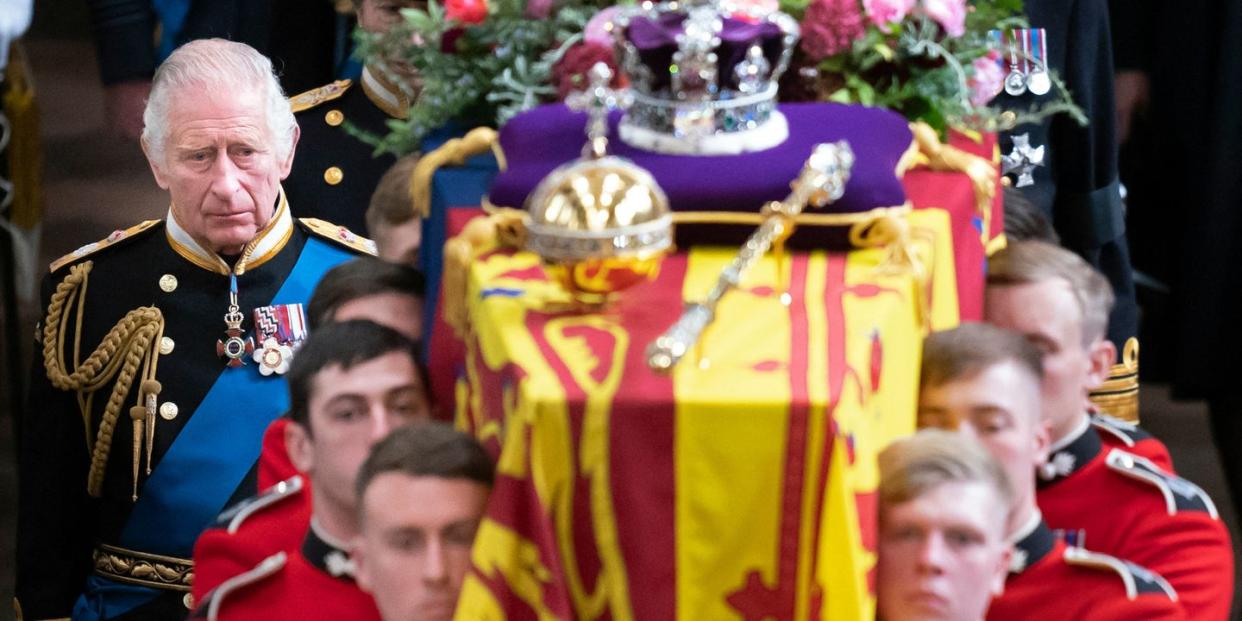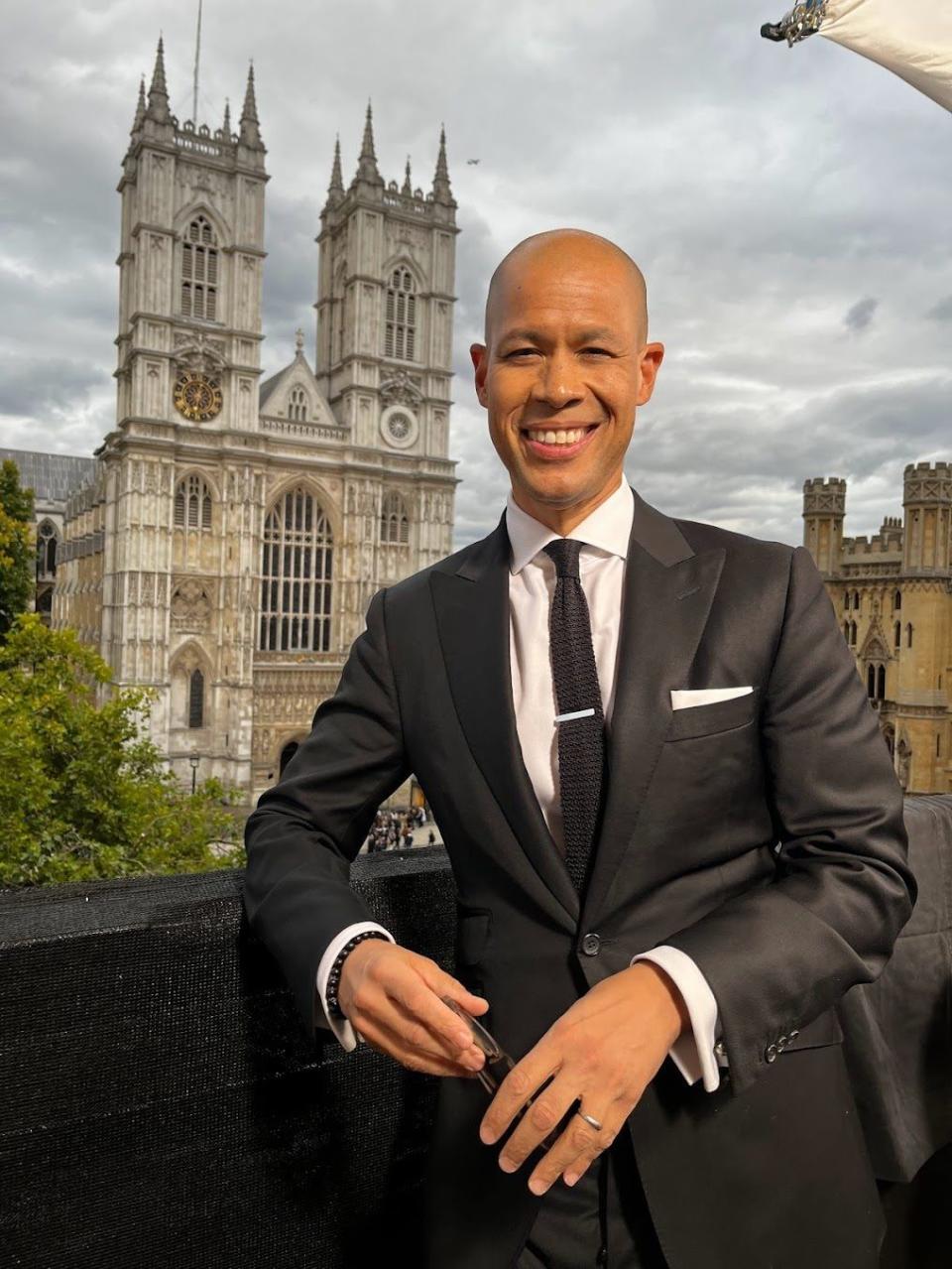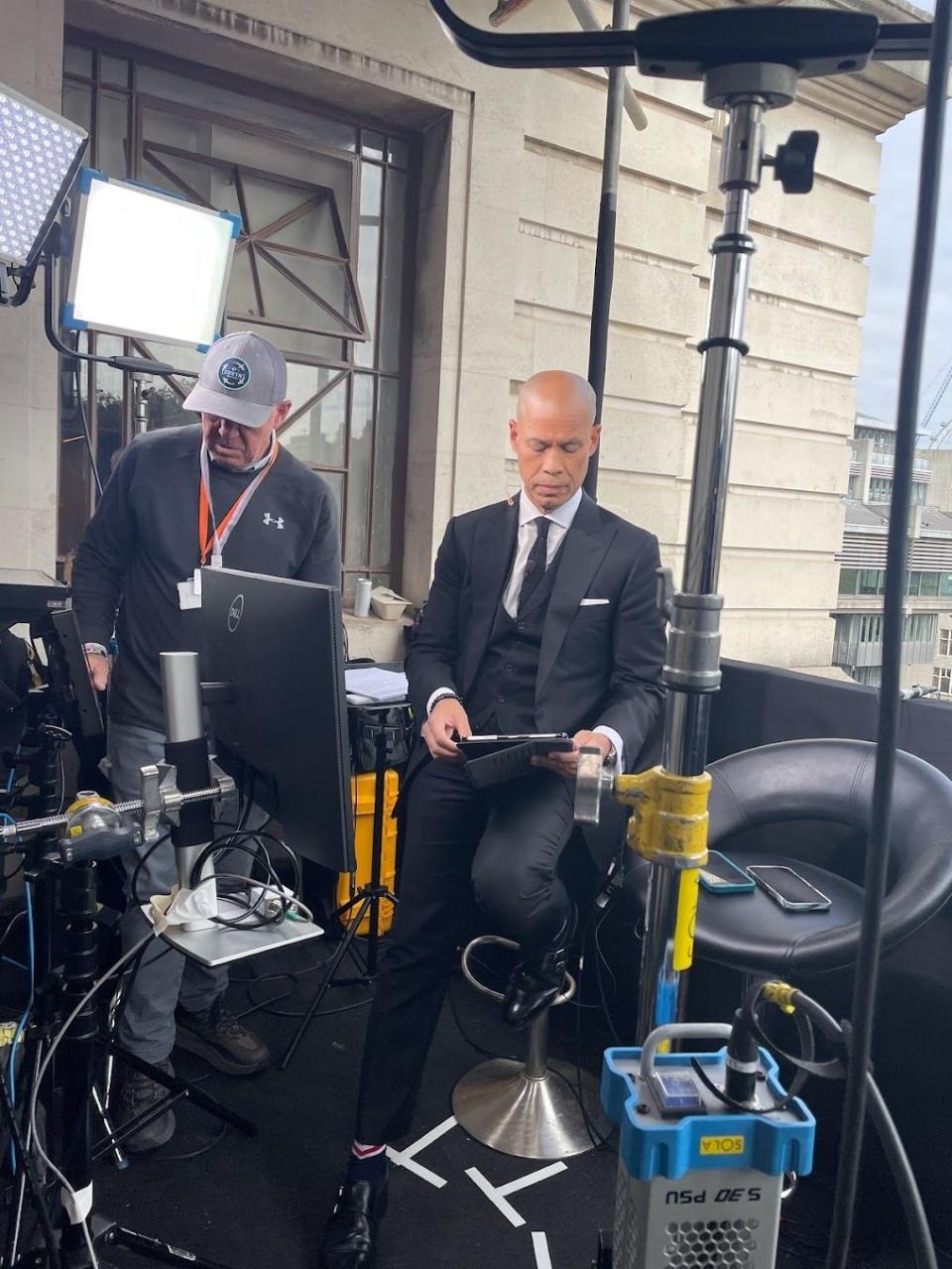'The Moment That Struck My Soul': A TV Reporter's Notes on the Queen's Funeral

- Oops!Something went wrong.Please try again later.
- Oops!Something went wrong.Please try again later.
- Oops!Something went wrong.Please try again later.
Inside the white, curved walls of London's Methodist Central Hall church, where there is a clear view from the balcony of Westminster Abbey, CBS News National Correspondent, CBS News streaming anchor and host of the What to Watch segment on CBS Mornings, Vladimir Duthiers was sitting in the midst of organized chaos. Wires snaked across the ground. Screens and lights were everywhere. It was Monday evening, 7 p.m. London time, and Duthiers had been reporting live on Queen Elizabeth II's funeral for 15 hours. Somehow, he was energetic as he greeted his fellow TV reporters who flitted around him.
"Gayle, say hi," Duthiers, 52, told me from across the Zoom screen. Gayle, of course, is his colleague Gayle King, co-host of CBS Mornings, who stepped past him on her way to dinner.
"You're very lucky to be talking to Vlad," King said, popping into the Zoom. "He can tell you everything about everything. And he has a baby on the way! He's going to name her Gayle. Doesn't Gayle Duthiers sounds nice?"
Kevin Frazier, host of Entertainment Tonight, passed behind King. "You promised to name your daughter, Kevin, right?" He said.
Duthiers' wife, Marian Wang, a senior producer at Last Week Tonight with John Oliver, is 20 weeks pregnant with their first child, a daughter, and he broke into laughter, listing all of the co-workers his daughter would be named after. "It's getting to be a very long name," he said.

Just beyond the bright, buzzing makeshift newsroom, the sun was setting, darkening the sky above the towering gothic arches of Westminster Abbey, where the royal family had sent off the coffin of Queen Elizabeth II only hours before.
With hundreds of thousands of people crowding the streets of Central London and millions more tuning in from home, the Queen's funeral became one of the most widely watched events in history. Duthiers, a self proclaimed history nerd, felt that his lifelong love of world history had prepared him to report on this once-in-a-lifetime moment. The mayor of London, Sadiq Khan, called the funeral an "unprecendented" event. The period of national mourning in the United Kingdom was filled with thousands of mourners taking to the streets, queuing for days to pay their respects to the queen. But there were also reports of anti-monarchy protestors, who held "Not My King" signs outside of Buckingham Palace, and some who were arrested for voicing their discontent with the royal family. There were those who were profoundly saddened by the loss of the Queen and those who have taken this historical moment as a chance to address long ignored issues of injustice stemming from the monarchy's colonial past. Duthiers, a native New Yorker and son of Haitian immigrants, connected these opposing cultural tensions in his coverage of the funeral.
"I love history, and it's one of the reasons I became a journalist," Duthiers told me. "We're witnessing something that we've never seen in our lifetimes, a momentous occasion that is the passing on of history that goes back for thousands of years."
The entire CBS News crew covering the Queen's funeral had been awake since before dawn preparing for the broadcast. “Everyone covering the funeral from our vantage point across from Westminster Abbey had to be in place by 5 o' clock in the morning,” Duthiers said. “We had to leave the hotel an hour before that, because all of the streets leading to Westminster Abbey near Piccadilly and Mayfair were shut down, so we all had to walk.”
Duthiers was dressed in a black suit and tie, matching the 2,000 mourners attending the Queen's funeral services, including world leaders like Emmanuel Macron, Joe Biden, and the Emperor Naruhito of Japan. During his 4 a.m. walk, Duthiers had passed thousands of people already saving their spots along the roads surrounding Westminster Abbey.
"All along the mall leading up to Buckingham Palace, people were camped out,” said Duthiers. “It was getting chilly, below 50 degrees yesterday evening, people were already camped out in tents, some wrapped in blankets, waiting for that one moment when they'd be able to catch a glimpse of the Queen's coffin as it made its way from Westminster to her final resting place in St. George's Chapel in Windsor. People spent more than 24 hours waiting to say their final goodbyes to Queen Elizabeth."
When we spoke on Monday, Duthiers had been reporting for more than 15 hours straight. Once the cameras were turned off, he finally got a chance to reflect on what he’d witnessed that day. He sorted through a thick stack of notes, searching for the right words to describe the moment that had resonated most with him.
"The moment that really struck me in the pit of my soul was when the Imperial State Crown, the orb, and the scepter were removed from the coffin by the crown jeweler. That moment symbolized the first time the Queen was separated from the throne since she ascended. The congregation began to sing 'God Save the King.' His entire life, King Charles III, had always heard 'God Save the Queen' as the British National Anthem, and now he was hearing it with himself as the monarch. I looked at his face, and it looked like he was on the verge of crying. It was a really beautiful moment. You could see that it finally struck him, that for the first time it was about a son about to bury his mother, and anyone can relate to that."
Duthiers paused, letting that moment wash over him. It seemed all the more significant, as he was on the precipice of becoming a parent, and about to be intimately familiar with the bond of parent and child. But his uncanny ability to place the moment into a larger historical context spurred him to address the opposing anti-monarchy sentiment that has been amplified since the Queen's death.
“I’m not blind to the very real issues here of colonialism and imperialism, and the history of the British empire that through its force of arms subjugated, oppressed, and repressed millions of people around the world. There’s no white washing that,” Duthiers said.
Reporting on the death of such a significant monarch, Duthiers felt the weight of balancing all the emotions of the moment. Duthiers was already familiar with London; the European headquarters of his previous employer, AllianceBernstein, was a 20-minute walk from Westminster Abbey. He'd often stayed at The Athenaeum Hotel during his visits, and he was able to stay there again while he reported for the Queen's funeral. The doorman of the hotel, Jim Burns, recognized him when he returned, making Duthiers feel as he had returned home. Duthiers, who'd studied world history meticulously, was able to recall the lineage from which Queen Elizabeth II descended with ease. His understanding of history, and his firsthand knowledge of British culture, helped him in reporting what he witnessed.

“As journalists, we have a front row seat to history," Duthiers said. "The sapphire that now sits on the monarch’s crown is alleged to be passed on from Edward the Confessor, who was king until 1066, and it was passed from monarch to monarch until this present day. People find comfort in that continuity.”
Keeping in mind the dichotomy between the past and the present, Duthiers tried to honor all of those nuances in his reporting.
“There are many Kenyans who still call for reparations from Britain, and Queen Elizabeth II has never really addressed it,” Duthiers said. He pondered how King Charles III’s reign would bring different expectations from the people of Britain. It seemed that the differences that divided the people of Britain were as large as the generation gap between each of its monarchs. But walking around the streets of London towards the funeral at dawn, Duthiers found himself captivated by the people around him, and they affirmed something he’d known for some time about the city he loved.
“It’s often said that Queens, New York, where I was born, is one of the most diverse communities on Earth, but so is London," Duthiers said. "As I walked through the streets last night and this morning, I saw people of different ethnicities, people from different lands fully represented. And I heard all the different languages being spoken—Welsh, Urdu, Farsi, Gaelic. It’s that beautiful diverse mosaic of cultures that I love.”
After we talked, Duthiers experienced something else memorable: an ultrasound with his wife—except he was in London, of course, and his wife was in New York. So he FaceTimed into the appointment. "I watched the sonogram and heard my daughter's heart rate," Duthiers said in a text message to me. "I saw her little hands and feet, tossing and turning in the womb, very active this daughter of ours. It just reminded me of the wonder and beauty of life. It was very emotional, and we were both grateful and happy that she was doing well."
Now he needs to figure out which one of his co-workers she'll be named after.
You Might Also Like

